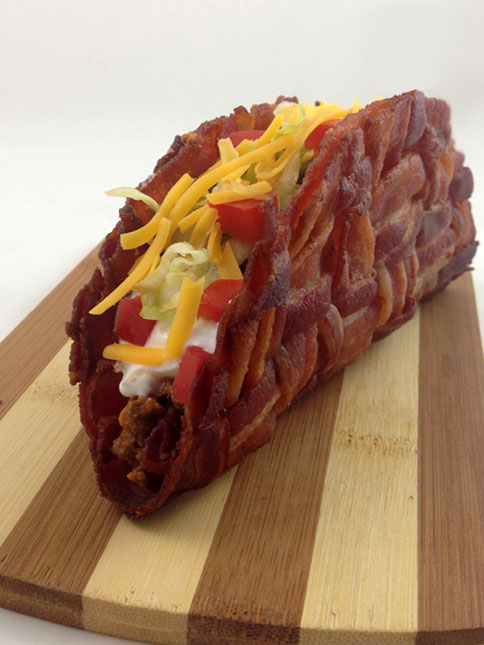Is your content a bacon weave taco?!
Search engines reward websites that consistently put up quality content, plain and simple. Put up great content, rank in search. Assuming you have a quality product or service to offer that people either want or need, you will make money. I know, because I write content that ranks in search. I have generated millions of dollars in sales for businesses, including one of my own, and paid the US Treasury taxes on the profit.
Content should not be regurgitation. Nobody wants to arrive at your website to find a Wikipedia article that you took a bite out of, vomited, and then tried to serve them. Search engines want to deliver people to the resources they are searching for, because that is how search engines retain users which make shareholders money. Therefore, your content should be like a taco. The taco should contain fresh ingredients, such as freshly cooked and seasoned ground beef, sour cream, and shredded cheese. Then, it needs to be packaged into something awesome, like a bacon weave taco shell.
Your packaging can be anything. If your content is text on a blog, the title and meta description should be appealing, but not misleading. If you’re posting a link to your content on a social media site, having a relevant and interesting image to go along with it can improve the chances of people reading it, sharing it, or clicking through to your website. I rarely promote my own content since I am busy with my clients, and using a bacon weave taco is about as distant as I’ll go when writing an article about content, but I love content, tacos, and bacon, so why not? Bacon is fun, diverse, and makes everything better, even small articles. Bacon even looks good as a hashtag and in all caps! #BACON … See what I mean? (No? That’s ok, beauty is in the eye of the beholder.) How, where, and when your content is shared opens up a whole new can of worms (content strategy and content marketing) which is beyond the scope of this article.
Some of the best advice is directly from Google. To some people this is common sense, others need it spelled out. Their quality guidelines accurately state:
- Make pages primarily for users, not for search engines.
- Google’s goal is to provide users with the most relevant results and a great user experience.
My first online experiences were at a very young age in the late 1980s. Before search engines existed, bulletin boards relied on word of mouth and experience. People would dial in to their favorite BBS of choice and play around. In the early 1990s I was able to create one of the most popular BBSs in New York. There was a “wall” that users were greeted with as soon as they logged in where they could enter a maximum of 1 line of text (this was also known as a graffiti wall). Keep in mind, back then modem speeds were so slow, you could literally read text as it displayed on the screen. But it was new, and fresh, relevant content. The forums were active, the games were active, so people kept coming back. It also helped that I was one of the first providers of Internet email in the state, but that is a story for another day.
The was I see it, nothing has really changed since the late 1980s. Sure, I remember when there were 10 websites and you had to view them via a text based browser, and now there are over 1 billion. And yes, I have a 4G connection on my quad core phone, but what brings people TO your online presence hasn’t changed, and probably never will.
Some of the best content I’ve seen put out it directly by the business owner, since they have a deep understanding and passion for their product or service. Not all of these business owners are great at creating content, or they do not have time for it. If you need assistance ranking in search or creating content jump over to my content creation page.
If you did not know a bacon weave taco existed or would like to see more artery-clogging food idea’s check out DudeFoods who allowed me to use this awesome image.
- Google “Pure Spam” Penalty Deindexes Sites March 6 2024 - March 12, 2024
- What Happened to ChicagoNow.com? - August 30, 2022
- The December 2021 Google Local Pack Algorithm Update - December 17, 2021





Leave a Reply